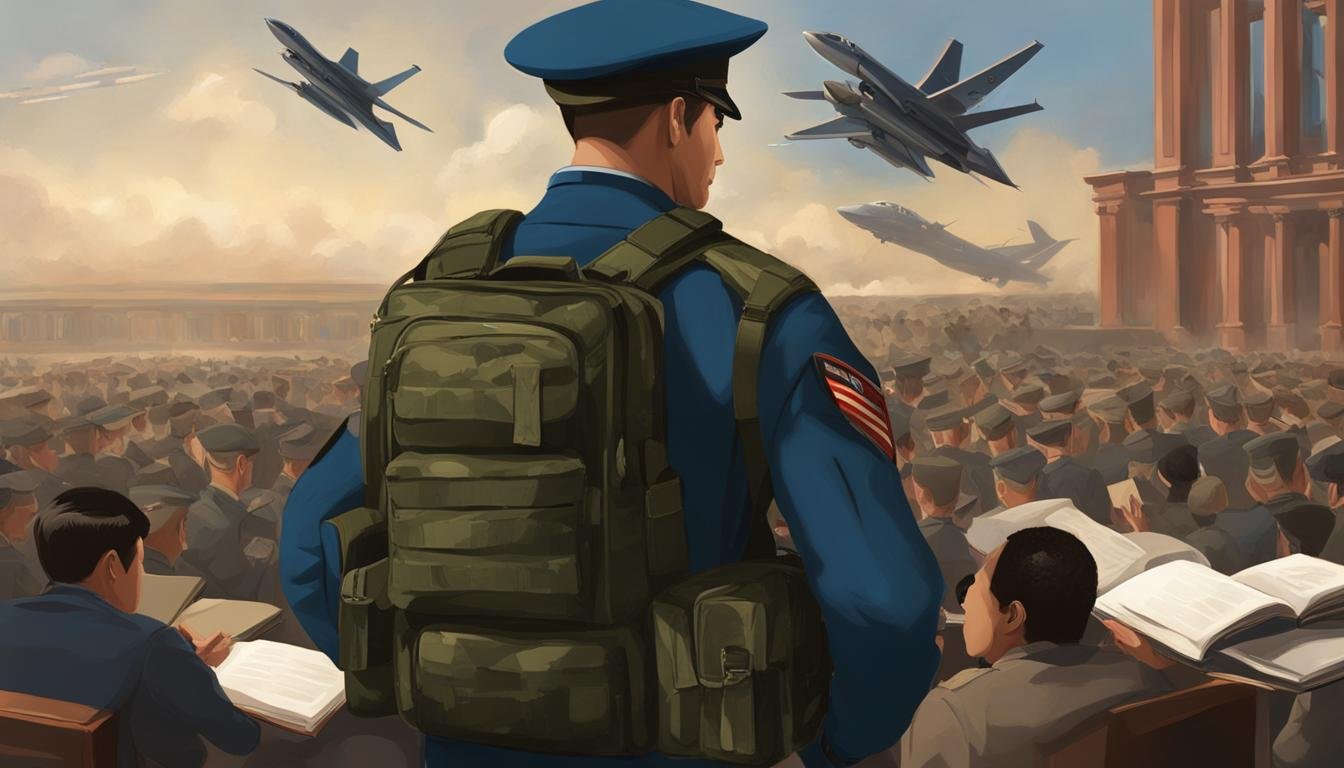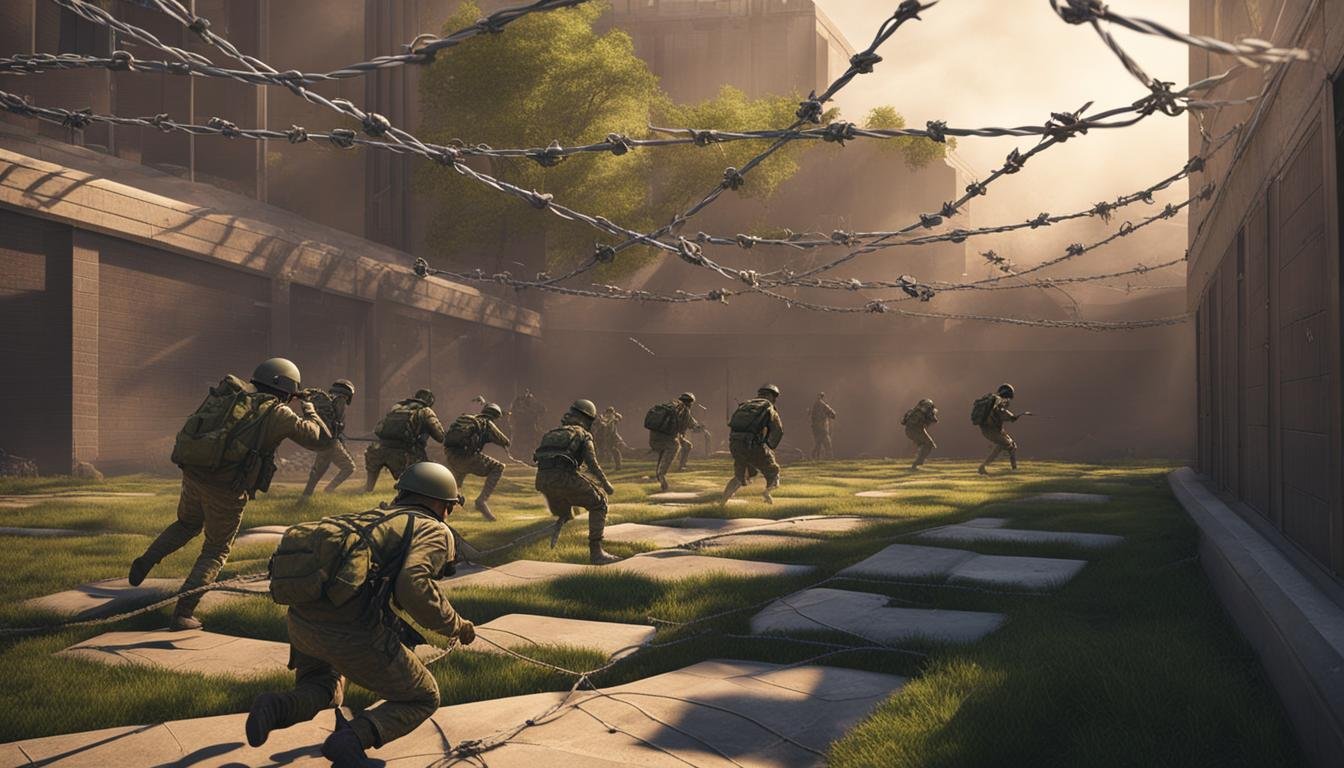The military is recognizing the need for college-capable individuals and is now promising postsecondary educational opportunities to recruits. Adult and continuing education in the military serves multiple functions, including recruitment, retention, and job placement. It also supplements military training and fulfills individual aspirations for education. There is a growing recognition that servicemembers need both “intellectual agility” and military skills. The challenge for higher education is to provide high-quality degree programs for servicemember-students that are comparable to on-campus programs for traditional students.
Key Takeaways:
- Integrating military training with higher education offers several advantages.
- Seamlessly transition between military service and college studies.
- Maximize educational opportunities by combining military expertise with specialized knowledge and skills from college education.
- Experience a more holistic educational journey, combining real-world military experience with academic knowledge.
- Strategies for combining military service and college studies are essential for success.
Advantages of Integrating Military Training with Higher Education
Combining military service with higher education offers numerous advantages for servicemembers. Not only does it allow for a seamless integration between military training and college education, but it also maximizes educational opportunities for individuals. By pursuing higher education while serving in the military, you can gain valuable knowledge and skills that can complement your military experience and open up new opportunities for career advancement.
One of the main advantages of integrating military training with higher education is the ability to combine the expertise gained in the military with specialized knowledge obtained through college studies. This unique combination can significantly enhance your skillset and make you more competitive in the job market. Employers often look for candidates who possess a diverse range of skills and experiences, and integrating military training with higher education can help you stand out from the crowd.
Furthermore, integrating military training with higher education can lead to a more holistic educational experience. While military training provides hands-on experience and practical skills, college education offers a more theoretical and academic approach. By combining the two, you can gain a well-rounded education that encompasses both real-world experience and academic knowledge. This comprehensive learning experience can contribute to your personal growth and development.
| Advantages of Integrating Military Training with Higher Education |
|---|
| Seamless transition between military service and college studies |
| Career advancement opportunities by combining military expertise with specialized knowledge |
| More holistic educational experience encompassing practical skills and academic knowledge |
Overall, integrating military training with higher education is a strategic decision that can benefit you both personally and professionally. It allows you to maximize your educational opportunities while serving your country and provides a pathway for career advancement. By taking advantage of the seamless integration between military service and college studies, you can acquire a diverse range of skills and knowledge that will equip you for success in the future.
Strategies for Combining Military Service and College Studies
Combining military service and college studies requires effective strategies to ensure success. By following these strategies, you can navigate the integration of military training and college education, opening up opportunities for career advancement and personal growth.
Choose a College Major Aligned with Your Military Occupation Code (MOC)
One strategy to maximize the integration of military training and college studies is to select a college major that closely aligns with your Military Occupation Code (MOC). By choosing a major that relates to your military experience, you can increase the likelihood of receiving transfer credits for the relevant coursework. This approach allows you to build upon your existing knowledge and skills, accelerating your progress towards earning a degree.
Research Colleges and Universities
Researching colleges and universities is crucial for finding the best fit in terms of credit transfer policies and support for veterans. Look for institutions that have established partnerships with the military or offer specific programs designed for servicemembers. Consider factors such as the availability of flexible class schedules, online learning options, and dedicated academic advisors who understand the unique needs of military students. This research will help you identify institutions that will support your goals and make your transition from military service to college smoother.
Obtain and Submit Military Transcripts
Obtaining copies of your military transcripts is essential for evaluating transfer credits and ensuring that you receive the recognition you deserve for your military training and experience. Military transcripts provide documentation of the courses you have completed and the skills you have acquired during your service. When applying to colleges, be sure to submit your military transcripts along with your application materials. This will enable the admissions department to assess your previous learning and determine the appropriate transfer credits.
Advocate for Yourself
If the transfer credit evaluation does not initially award you the credits you expected, do not be discouraged. Remember to advocate for yourself and appeal the decision if necessary. Provide additional documentation or explanations that demonstrate the relevance and rigor of your military training. Sometimes, a well-presented appeal can lead to a successful review and the awarding of additional credits. Be proactive in advocating for the integration of your military training and college studies.
| Strategy | Pros | Cons |
|---|---|---|
| Aligning with MOC | – Maximizes transfer credits – Builds upon existing skills – Accelerates degree progress |
– Limited scope of options – Requires in-depth research |
| Researching Colleges | – Identifies supportive institutions – Assists in finding flexible programs – Ensures a smooth transition |
– Time-consuming – Requires careful evaluation |
| Obtaining Transcripts | – Provides documentation of skills – Enables credit evaluation – Recognizes military experience |
– May require additional paperwork – Evaluation may not meet expectations |
| Advocating for Yourself | – Increases chances of credit award – Highlights the value of military training |
– Takes persistence and effort – Not guaranteed success |
How Can Military Training Enhance College Studies?
Military training can enhance college studies by instilling discipline, time management, and leadership skills in individuals juggling military and college duties. The structured nature of military training also helps individuals develop a strong work ethic, adaptability, and the ability to handle high-pressure situations, all of which are transferable to academic pursuits.
Conclusion
Integrating military training with college studies is a strategic move that offers numerous advantages. By combining education and training, servicemembers can enhance their skills and knowledge while serving their country. This integration not only benefits the individuals themselves but also contributes to the overall strength and effectiveness of our military forces.
One of the key advantages of integrating military training with higher education is the opportunity for career advancement. By combining the expertise gained in the military with specialized knowledge obtained through college education, servicemembers can position themselves for higher-level roles and greater responsibilities within both the military and civilian sectors. This combination of practical experience and academic learning can create a unique skill set that is highly valued in today’s competitive job market.
Moreover, integrating military training with higher education fosters a more well-rounded and holistic educational experience. It allows servicemembers to apply their real-world military experience to academic concepts, gaining a deeper understanding of the subjects they study. This integration of education and training promotes critical thinking, problem-solving, and adaptability, equipping servicemembers with the intellectual agility necessary to excel in a variety of professional settings.
Ultimately, recognizing the value of education and providing opportunities for servicemembers to pursue higher education benefits not only the individuals but also society as a whole. By investing in the educational development of our military forces, we ensure that they are equipped with the skills, knowledge, and leadership capabilities needed to tackle the challenges of the future. Education versus training is not a choice that needs to be made; rather, integrating the two is a powerful strategy that propels servicemembers to reach their fullest potential.



